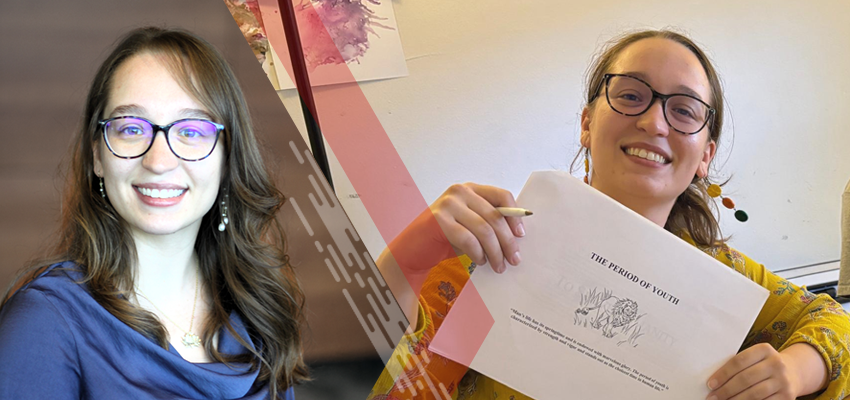We celebrate the class of 2025 and the impact they’ve had on each other, our campus community and beyond! A few of our UW School of Medicine and Public Health (SMPH) graduates shared some of the most meaningful aspects of their time at UW, as well as what they hope to accomplish in the future.
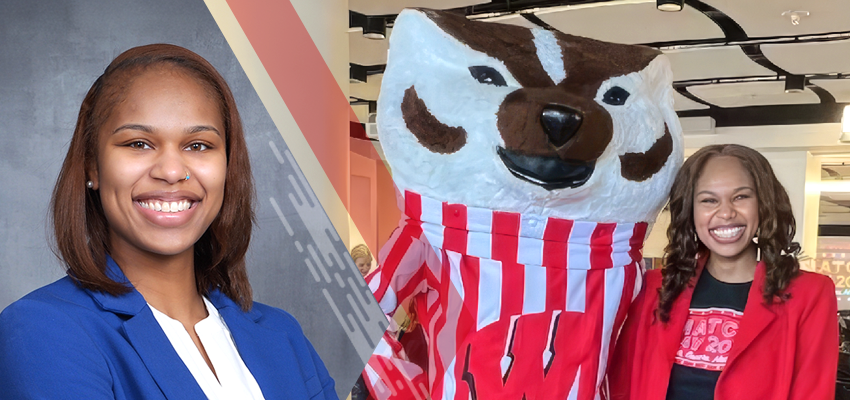
Jessieka Knazze
Doctor of Medicine, UW School of Medicine and Public Health
BA, Physiology, University of Minnesota
For Jessieka Knazze, the journey to medicine started with a simple but powerful feeling: awe. The first time she studied anatomy and physiology, she was amazed at how every system in the human body works together. But it wasn’t just the science that called to her. It was the chance to stand beside people in some of their most vulnerable moments, combining knowledge and compassion to make a real difference.
The dual MD-MPH pathway at UW, along with the Training in Urban Medicine and Public Health (TRIUMPH) program, offered Jessieka a unique opportunity to develop as both a physician and a public health advocate. While based in Milwaukee, she conducted research with health equity firm Jump At The Sun Consultants, gaining a deeper understanding of the social determinants of health that lead to disproportionate tobacco use in the city’s Black communities and the importance of community-driven approaches to encourage cessation.
Among the projects she has undertaken in her specialty of plastic surgery, two stand out as particularly impactful and meaningful. One explored environmental factors associated with orofacial clefting (cleft lip and palate) and advocated for policy changes to reduce these congenital differences. The other focused on innovative materials to improve global access to microsurgery, including using Japanese Shirataki noodles that can hold microsutures. These experiences reinforced her belief that tackling tough health issues requires people from different backgrounds to work together.
Jessieka’s path has not been easy. During her first year of medical school, her father experienced a life-altering health issue. Balancing caregiving, coursework, and research taught her a kind of resilience no textbook could offer. She carries with her a deep awareness of how health care impacts not only individuals but entire families and communities.
Now, Jessieka is preparing to begin her Integrated Plastic and Reconstructive Surgery residency at Cooper University Hospital in New Jersey. She is driven to be a surgeon who restores not just the physical form of her patients, but also their confidence, dignity and hope. By standing up for equitable care and tackling the root causes of health disparities, she hopes to build a health care system where every person feels seen, supported and empowered on their journey to healing
Congratulations, Jessieka!
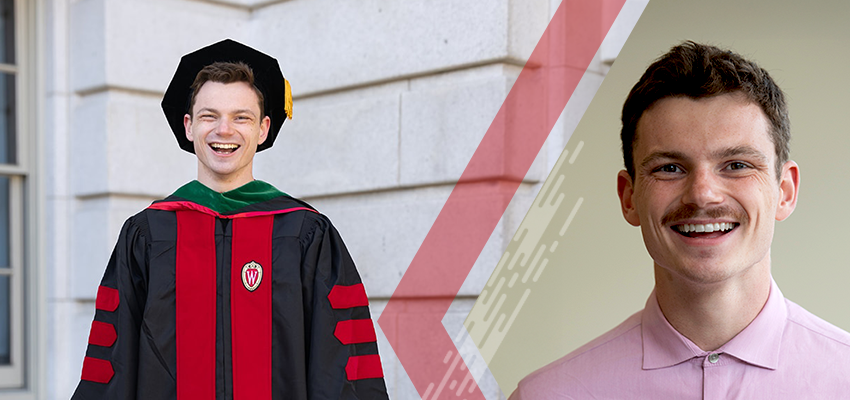
Luke Stavedahl
Master of Genetic Counselor Studies, UW School of Medicine and Public Health
BS Genetics Cell Biology and Development; BA, Spanish Studies, University of Minnesota
Luke Stavedahl is well aware that his time with patients may be brief: a single visit, one conversation, one moment in a much longer journey through the health care system. Knowing this, he has made it a priority to understand the broader patient experience. As he graduates and begins his career as a genetic counselor, that mindset has shaped him into a clinician who is ready to advocate, connect and contribute to better outcomes.
Luke decided to come to UW during his program interview with faculty and leadership. Through those conversations, he felt true authenticity and a high level of investment in his success. The environment promised academic and professional growth while providing support. “I have continued to be inspired by the thoughtfulness my mentors and supervisors bring to their work, and I’m proud to be part of a profession that is both cutting edge and human-centered.”
The Master of Genetic Counselor Studies program allows students to select electives, and Luke pursued his interest in patient advocacy. Working with clients at the Center for Patient Partnerships Health Justice Clinic, Luke tackled challenges such as insurance denials and provider misunderstandings, while learning about the complexities of healthcare systems and laws. This multidisciplinary environment allowed him to collaborate with students from law, public health, and pharmacy, enhancing his understanding of patient experiences and advocacy.
In addition to his coursework, Luke worked as a project assistant for the Graduate School, contributing to the graduate student newsletter, coordinating professional development events, and supporting school activities. He also completed a certificate in Consumer Health Advocacy, building on an internship in direct patient advocacy and academic work focused on healthcare policy and advocacy.
After graduation, Luke will return to Minnesota to work as a cytogenetics-focused laboratory genetic counselor at M Health Fairview. He aims to advocate for greater access to genetic counseling and testing.
Congratulations to Luke, who is one of eight 2025 graduates of the Master of Genetic Counselor Studies (MGCS) program!
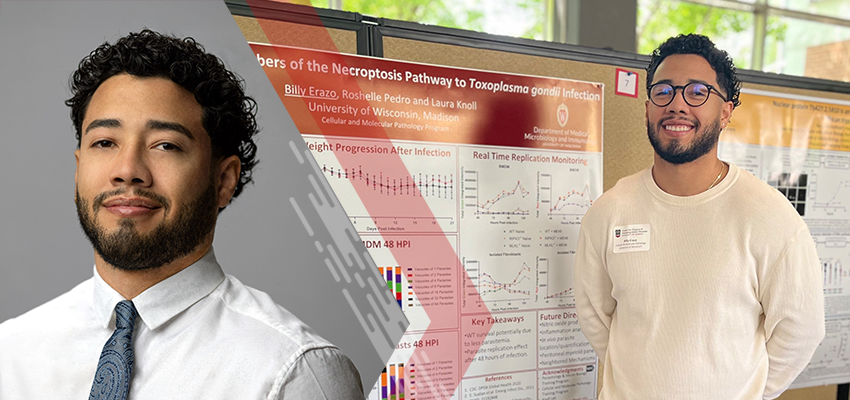
Billy Erazo
PhD Cellular and Molecular Pathology
BS, Industrial Microbiology, Universidad de Puerto Rico
“At UW, I learned to think beyond the bench and consider the broader implications of my work and how scientific discoveries translate into real-world health outcomes, especially for vulnerable populations.”
Billy Erazo‘s journey began with a passion for understanding diseases at the cellular level and a desire to improve patient outcomes. This led him to the Cellular and Molecular Pathology graduate program at the University of Wisconsin–Madison, where he found a perfect match for his scientific curiosity and commitment to making a difference.
Billy chose UW because of its strength in immunology and infectious disease. He was equally impressed by the people, the mentorship, and the way UW helps students think bigger.
In the lab of Laura Knoll, PhD, associate dean for basic research training and professor of medical microbiology and immunology, Billy studied how immune responses shape infection outcomes. He learned to ask better questions and gained confidence, clarity and a deep understanding of what it means to be a thoughtful, rigorous researcher.
And he didn’t stop there.
After participating in the Morgridge Entrepreneur Bootcamp, Billy started to explore life sciences consulting. He wanted to bring therapies to patients faster. He added a business minor to build the skills he’d need to lead in that space. He started thinking not just about experiments, but about strategy and innovation.
Knoll, his mentor, saw it firsthand. “Billy is a fantastic graduate student in so many ways. Not only is he a top-notch scientist, but he goes out of his way to mentor the next generation and inspire his lab mates.”
That kind of leadership didn’t go unnoticed. Billy received the 2025 William C. Campbell Excellence in Parasitology and Vector Biology Award and the 2024 Robert and Carol Deibel Distinguished Graduate Fellowship. These honors reflect both his scientific talent and the impact he’s had on those around him.
Now, with his PhD complete, Billy aspires to join the life sciences consulting field. He aims to help companies make smart, patient-focused decisions at the intersection of science and strategy. Billy is eager to contribute to bringing therapies to market that are not only innovative but also equitable and impactful.
We congratulate Billy and all the MS and PhD students who were members of the school’s 13 graduate programs and 7 affiliated programs.
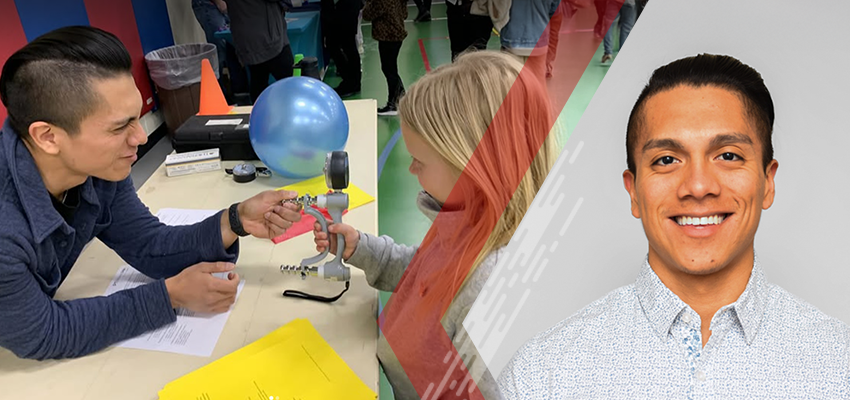
Onergis Martinez
Doctorate of Physical Therapy, UW School of Medicine and Public Health
Over the last few years in his physical therapist assistant (PTA) career, Onergis Martinez saw the power of movement to restore confidence and independence across a variety of settings. But he also recognized the limits of the current healthcare system: rushed visits, surface-level care, and patients falling through the cracks. These experiences lit a fire and ultimately led him to return to school to earn his Doctor of Physical Therapy.
Onergis says he chose UW because it felt like the right fit, not just academically but in terms of values. “I’ve always been drawn to the idea of using movement as medicine, and UW’s focus on clinical reasoning and long-term wellness really matched that.”
In one clinical experience in the emergency department, he moved fast, screening patients, collaborating with physicians, and using tools to address vertigo to bring real-time relief. “It showed me how physical therapy can have an immediate impact, even in high-pressure settings.”
In contrast, his time in a school-based pediatric setting taught him to slow down. There, he saw that progress looked different: small gains in movement, growing independence, and the quiet confidence that comes from being supported over time. “I saw how much it means when care is consistent and personalized, especially for kids still figuring out how to move through the world.”
Onergis hopes to create a small, community-based space focused on pro bono physical therapy and wellness education for Spanish-speaking individuals. While still years away, the vision includes walk-in consults, movement classes, and early interventions to help prevent chronic conditions before they take hold. He aims to shift care from crisis response to consistent, movement-based prevention, especially in communities that often face barriers to early support.
After graduation, he will continue working for Transitions at Home, which provides one-on-one care in the patient’s home environment, offering a unique opportunity to support older adults where they’re most comfortable. He first began working there in 2020 as a PTA and will return as a Physical Therapist to help seniors stay active, safe and confident in their daily lives.
Reflecting on his journey, Onergis expresses gratitude for the mentors, patients and classmates who have shaped his path.
Join us in congratulating Onergis, one of 38 graduates of the Doctor of Physical Therapy (DPT) program!
Zoe Gibbons
Master of Public Health, UW School of Medicine and Public Health
BS, Biology, Angelo State University
Meet Zoe Gibbons, a soon-to-be graduate of the Master of Public Health program. Zoe’s journey to public health was anything but straightforward, but it was filled with purpose and passion.
After a year of service with AmeriCorps working for a diabetes coalition, Zoe moved to Madison, WI, to live with her grandmother. She joined the Wisconsin Department of Health Services and was quickly immersed in the COVID-19 response, working on the personal protective equipment distribution team. This intense period set the stage for a future in public health.
Zoe’s connection to the Bahá’í faith plays a significant role in her journey. She facilitates a junior youth program that combines moral and spiritual education with community service. Working with youth who had experienced trauma, talking with families about needed resources, and visiting homes in her neighborhood inspired her to question how she could best meet the needs of the population.
Through critical thinking and research, Zoe discovered her passion for public health, particularly in areas like social justice, education, systems, community-building, trauma-informed practice, prevention, and social determinants of health. She decided to pursue a Master of Public Health to gain the framework needed to integrate her experiences and aspirations with her faith.
UW’s MPH program was a natural fit. She felt the program’s commitment to community engagement, diverse faculty, and practice-oriented approach aligned perfectly with her goals. She is committed to growing intellectually and spiritually, contributing to the transformation of society.
Zoe shared that one of her most cherished experiences was bringing neighborhood kids to campus and the Health Sciences Learning Center to explore different career pathways. This not only inspired the children but also reinforced Zoe’s commitment to public health and community service.
After graduation, Zoe plans to continue her work with the Bahá’í Regional Training Institute, coordinating community-building activities and disseminating learning at various levels. She envisions a career dedicated to service, uniting science and spiritual principles, uplifting and working alongside communities.
We congratulate the 42 graduates of the Master of Public Health (MPH) program, 20 of whom achieved a dual degree!
